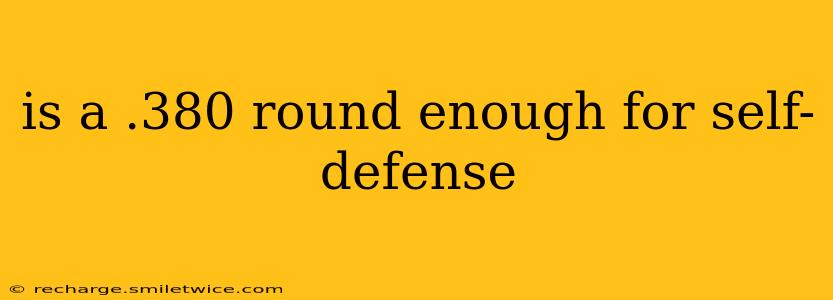The question of whether a .380 ACP round is sufficient for self-defense is a complex one, sparking debate among firearms enthusiasts and experts alike. There's no simple yes or no answer, as effectiveness depends on various factors beyond just the caliber. This guide explores the pros and cons, addressing common concerns and offering a balanced perspective.
What are the Advantages of a .380 ACP for Self-Defense?
The .380 ACP (Automatic Colt Pistol) boasts several advantages making it a popular choice for concealed carry:
- Smaller Size and Lighter Weight: .380 pistols are generally smaller and lighter than larger calibers like 9mm or .45 ACP, making them easier to conceal and carry comfortably. This is crucial for individuals who prioritize ease of concealment.
- Reduced Recoil: The lower recoil of the .380 makes it easier to shoot accurately, especially for individuals with less experience or smaller builds. This translates to faster follow-up shots, a critical factor in a self-defense situation.
- Availability and Affordability: .380 ammunition is widely available and relatively inexpensive compared to some other calibers. This accessibility is a significant factor for many.
What are the Disadvantages of a .380 ACP for Self-Defense?
While offering advantages, the .380 also presents limitations:
- Lower Stopping Power: Compared to larger calibers, the .380 generally possesses less stopping power. This means it may require more precise shot placement to incapacitate a threat effectively. The smaller bullet diameter and lower energy transfer can result in less tissue damage.
- Penetration: The smaller bullet may not penetrate deeply enough to reliably stop a threat, especially through clothing or barriers. This is a crucial consideration, as a self-defense situation is often unpredictable.
- Limited Range: The .380's trajectory and energy decrease more rapidly over distance compared to larger calibers, reducing its effectiveness at longer ranges.
Is .380 Enough for Self-Defense? The Crucial Factors
The effectiveness of any caliber in self-defense hinges on several crucial factors beyond the round itself:
- Shot Placement: Accurate shot placement is paramount, regardless of caliber. A well-placed shot from a .380 can be far more effective than a poorly placed shot from a larger caliber. Training is key.
- Ammunition Selection: Choosing high-quality, self-defense ammunition designed for expansion and penetration is critical to maximize the .380's effectiveness. Hollow-point rounds are generally preferred for self-defense.
- Training and Practice: Regular practice is essential to develop proficiency and accuracy with any firearm, including a .380. This includes mastering the fundamentals of marksmanship, weapon handling, and defensive tactics.
What are some alternatives to .380 for self-defense?
Several alternative calibers offer greater stopping power and penetration:
- 9mm: A popular and widely available choice offering a good balance of stopping power, capacity, and recoil management.
- .45 ACP: A larger caliber with significantly more stopping power, but with increased recoil and larger size.
Is the .380 better than other calibers for self-defense?
No single caliber is universally "better" for self-defense. The ideal choice depends on individual factors like physical build, experience level, comfort, and intended carry method. A smaller, lighter .380 might be preferable for someone who prioritizes concealability, while a larger caliber might be better suited for someone seeking maximum stopping power.
Conclusion: A Balanced Perspective on the .380 for Self-Defense
Ultimately, the suitability of a .380 for self-defense is a personal decision. While it offers advantages in size, weight, and recoil, its limitations in stopping power and penetration should be carefully considered. The key is to prioritize thorough training, select high-quality ammunition, and understand the limitations of any firearm chosen for self-defense. Consulting with firearms experts and undergoing professional training is highly recommended before making any decision regarding self-defense firearms. Remember, responsible gun ownership and adherence to all applicable laws are paramount.
